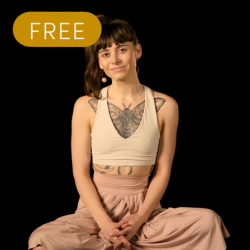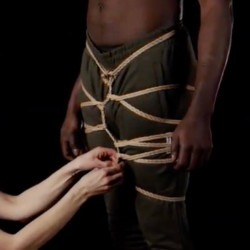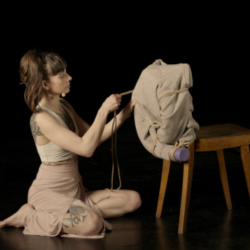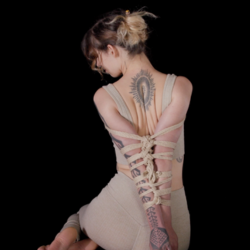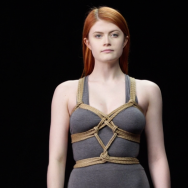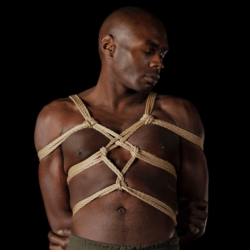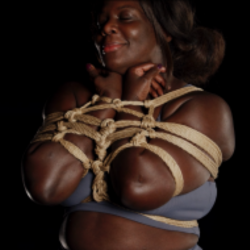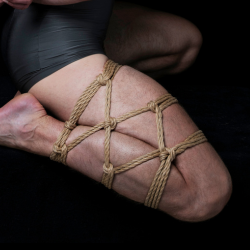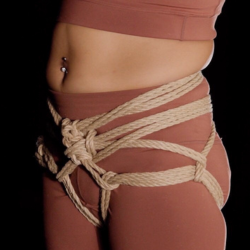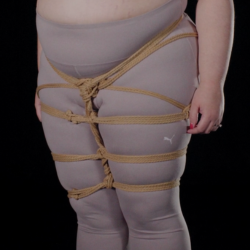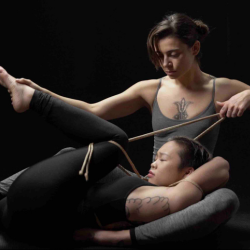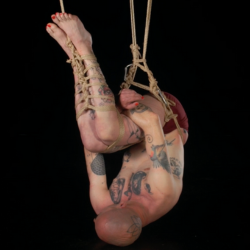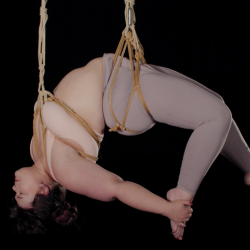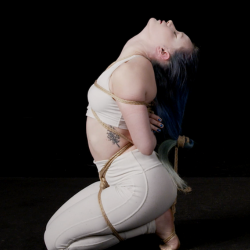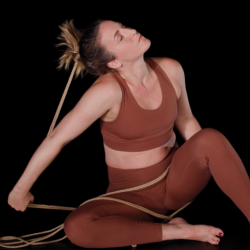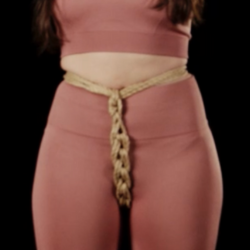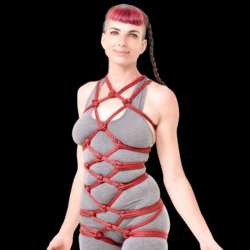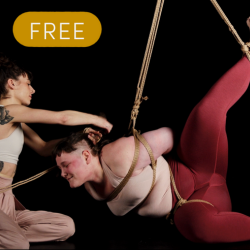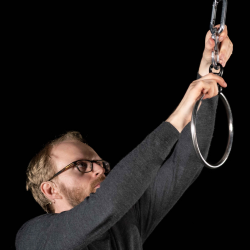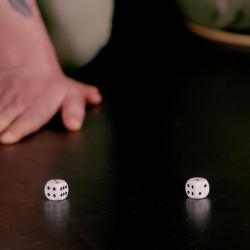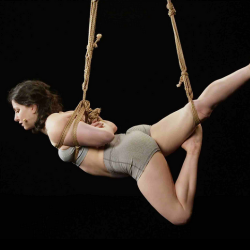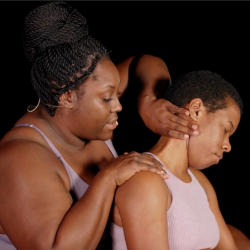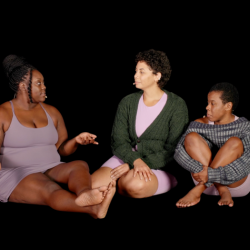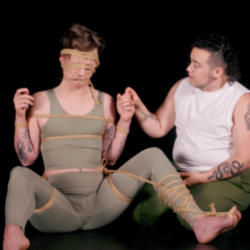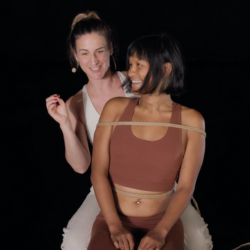EP 19
ASHLEY RAY
In this episode, Ashley Ray delves into the world of rope bondage, emphasizing its connection to human psychology and vulnerability. They demystify the concept of subspace and highlight the importance of accountability within the kink community.

Ashley Ray (she/they), aka. Rayz of Ash, is a licensed clinical professional counselor and mental health educator/speaker. As a body positive model and creator of a humanistic paradigm shift, they demonstrate the intrinsic understanding that as humans we exist upon a spectrum of being. Ashley also practices rope as an educator, performer and constant student. She believes that kink provides a direct approach for a confrontation of our humanity, sex and death, an exploration of our primal natures, along with the interplay of these concepts and the environment. Connect with Ashley on IG/FL: @Rayz_of_Ash or www.MisOrdered.org
Wicked Wren [00:00:14] Hello everyone, and welcome to the Shibari Study podcast. I'm Wicked Wren and today I'm speaking to Ashley. She uses she/they pronouns and you'll know her as Rayz of Ash online. She's a professional therapist, a body-positive model, a writer and artist, wears many, many very cute hats. How for you?
Rayz of Ash [00:00:37] I'm amazing. Thank you. And yourself?
Wicked Wren [00:00:40] I'm doing so, so, so well. You're in Vegas right now, and I think it's like 150 degrees outside, right?
Rayz of Ash [00:00:47] At least.
Wicked Wren [00:00:48] God. You said you moved there during the pandemic time, right?
Rayz of Ash [00:00:52] Yeah. March 1st, 2020. So beautiful timing to start a new path in life, right? Right two weeks before after the shutdown. It is an interesting time to come here and experience Vegas in a very different way.
Wicked Wren [00:01:09] Yeah, I never thought about that juxtaposition because Vegas is so bustling and so crazy and then you move there and there's nothing happening at all.
Rayz of Ash [00:01:18] Yeah, There was times that you could actually just walk down the strip with nobody there, like on the street, right? Because there are no cars.
Wicked Wren [00:01:27] It's kind of wild. Isn't that nice, though? Like no cars in the street and you can actually walk around and not worry about being run over by a big car. And it's kind of nice.
Rayz of Ash [00:01:38] It is nice but, you know, that's part of what I love about Vegas is I love the energy and all the people and the diversity. And there's constantly something here.
Wicked Wren [00:01:47] Absolutely. So before you moved to Vegas, what were you up to? What was going on in life?
Rayz of Ash [00:01:54] A lot of the same things just in a very different part of the country. I've been a therapist for a really long time, and when I was in Oklahoma, where I came from between Oklahoma and Texas, those are my old stomping grounds.
Wicked Wren [00:02:08] I love it.
Rayz of Ash [00:02:12] I've worked with children and families, historically, worked at the university teaching psychology, and I also began modeling while I was there and rope. So I began everything there. Coming to Vegas was a way to move out of being a big fish in a little pond and to feel more challenged.
Wicked Wren [00:02:32] How are like the communities and the LGBT worlds in Oklahoma and Texas versus Vegas, how different is it?
Rayz of Ash [00:02:42] Puh. So this is what's very interesting. In Oklahoma or Tulsa, where I was primarily living before I came here, has three active dungeons and did at the time. And those dungeons actually work. Yeah, I see your face. So those dungeons work really well together. They support each other and I've had some of the best rope and (…) education that I've had access to in those areas. Now, LGBTQ very different story, right? Like you're going to find your pockets of support of that. But there's a reason why. So the dungeons are very underground there as well, right? Whereas here you're going to see people walking in the streets in harnesses and, you know, just stop doing whatever. But there's no active dungeons.
Wicked Wren [00:03:34] Do you feel like since in somewhere like Tulsa, where you can't walk around on the street in a harness, it makes more, quote-unquote, community?
Rayz of Ash [00:03:44] That's an interesting thing to think of. I think so because you feel this sense of you kind of need to band together and support each other in that way because, you know, there is that fear. I think a lot of us experience in a lot of communities when we feel like we're not part of that community in full acceptance of who we are.
Wicked Wren [00:04:06] Isn't it strange that Vegas doesn't have a lot of like fun dungeon time? Like you can just go and, like, hang out and stuff like that. I feel like everything is very monetized.
Rayz of Ash [00:04:20] It absolutely is. And that's, that is it, right? So, you know, (…) doesn't really make money. It's that, it really supports your passion.
Wicked Wren [00:04:28] Yes.
Rayz of Ash [00:04:30] So yeah, everything in Vegas is about the hustle and you don't also don't want to compete with the big hustle right on the strip. So it is weird. There are parties here and there, but yeah, I mean, I miss the, I just said this to somebody this morning, like, I miss the play parties. I miss knowing that like the dungeon party this weekend and I'm going to go see some wild (…) and participate in it as well.
Wicked Wren [00:04:56] It's so funny you said that (…) doesn't make money and other things support (…). One of the, I guess, myths that I really believed in the beginning was that (…) was for very poor people. It was underground, was all these kinds of things. In actuality, (…) is very expensive to do, and most people do not do this for a living outside of pro (…) workers, outside of pro (…), etc., etc.. And obviously, there are people that do rope as their primary occupations. Very, very, very small percentage of people.
Rayz of Ash [00:05:29] Yeah, and I've done it. So I used to handmake rope. So I know what that looks like to have even a product that you're selling and trying to at all places as well as teaching rope so you can, you can see in different communities how much access there is through that. And you're right, it's extremely expensive to be able to carry out, right. Just like anything that you really want to learn to a higher level. You have to invest in one way or another.
Wicked Wren [00:06:03] Even the time cost is quite high.
Rayz of Ash [00:06:06] Absolutely.
Wicked Wren [00:06:07] It's very hard to learn. You said that you're a body-positive model. What does that mean to you?
Rayz of Ash [00:06:15] To me, that means when I model, I am just being me. I'm not altered. As for photographers, you can please like make this your, your art. I want you to do the color and editing in those ways that make sense for you and make this feel like you. But please don't change my body in a way that affects what I actually look like. And to me, that's about inspiration. Originally when I began body-positive modeling, it was a journey for myself. I have always been fairly confident in who I am, and that last part of acceptance and love for my body was not there. I, most of us grew up in a very fat-shaming culture and especially some of the families that I grew up in. It was very much part of that culture that your weight was tied to your worth. And I haven't always been a bigger person. I've been all over the place. So I've had different experiences of, you know, feeling and looking thin and how people responded to me then and what the comments even made about my health. And then on the other end as well, right. Being a fat person and how people make assumptions and comments about my health. It allowed me to start exploring. The appreciation for what my body is doing, is allowing me to live. Like my, my body allows me to live and to do things. And once I started being able to push through that for myself, through just baby steps of exploration, of doing the modeling and reading the body positive community, because we all need support to get anywhere. I saw how inspiring it was to others. Messages from people, all types of humans saying, you know, just seeing your photos, I can see your confidence or your body looks like mine and you look so (…) like, so that makes me feel like I can be too. And that's now why I do, that's part of why I do it. I want to, I want to punch people in their gut and make them really feel and think of as they see my modeling and art. Yeah.
Wicked Wren [00:08:31] Was there a time where you didn't have the body-positive part before model? Was there a time where you maybe were changing yourself for other people and then you decided, (…) this, I don't want to do it or no?
Rayz of Ash [00:08:44] So I, modeling about body positivity went hand in hand for me, and that's how I started to even explore it. This was back in the days of the beginning of Instagram, and I started as Nefarious00 because, you know, I'm a therapist and I was a professor at a university and I didn't want anybody to see any of these photos. So, you know, this was my underground me. So that's how I started to look at it was through the modeling and how I was able to explore. I was also living a life where I wasn't very happy in the way that I was living, and the modeling allowed me to kind of have an excuse to go out and do new things, dress up in different ways and, you know, meet different people and have different experiences because before that, I had really had the impression that a fat person didn't have worth. That's what I've been conditioned, right? Like, I'm fat and frumpy and I should just stay at home and wear baggy clothes and nobody has to be disgusted by me. And, you know, Oh, well, to wear like... You've seen my Instagram today. We're lucky to get clothes on me. We're lucky I'm wearing clothes right now, to be very honest with you.
Wicked Wren [00:10:03] And when did you find (…) in this journey? I imagine it was modeling first and then finding (…) and rope.
Rayz of Ash [00:10:11] So there were some things that I did that were (…) when I was younger and play, but they weren't anything that I realized. Like, you know, I did water sports on my prom night but didn't really, you know, like I was doing a thing for fun, you know? And then I was married for a really long time in a very (…) repressed marriage. So there wasn't any exploring. Whenever I started teaching at the university, one of my favorite classes was like psych of human sexuality and, you know, (…) and death. I stare have my soapbox tissues and I can go on about that forever. But so I love exploring that topic for various reasons. But there's a lot about (…) in psychic human sexuality, right? It's very interesting. And I started being more curious then and then through the modeling, kind of like I think a lot of people do, especially these days with, with Instagram and FL. I saw a picture of a rope shoot that a photographer I had worked with previously had done, and I was like, I want to do that. And they were like, Well, you need to contact the rope person and if they want to do that with you. And they did. So, yeah, so that I kind of say, I literally fell for rope one night and here we are today.
Wicked Wren [00:11:36] Now we're talking. Going back a little bit, you said your (inaudible) is (…) and death. What does that mean?
Rayz of Ash [00:11:45] And that will also lead me into like my passion for teeth actually. I'm happy to link those together. It makes me very excited to do so. So for as long as I've been in the therapy world and the psychology world working to understand humans, one thing I really noticed is (…) and death link us as humans, no matter what type of human you are. (…) and death are showing up in your life, throughout your whole life, and every single relationship you're going to have. And in our culture specifically, we do almost everything we can to avoid anything about those things. We don't look at it. We don't talk to each other about it. We don't understand that it's part of our health. We just don't deal with it. And so I feel very strongly that for us to really be able to be the most of ourselves that we can be, we have to be able to confront (…) and death. And that leads me to my passion for (…), because I think (…) and then, you know, really rope bondage, where always I'm going to go. But any type of (…) offers us a platform and a forum to explore those things. A confrontation of our humanity. You know, we're pushed to the edge of facing death like things and (…) things, and then hopefully having a space of acceptance and beauty while we're doing that, while we're sitting in that suffering, which is what life is a lot of.
Wicked Wren [00:13:08] Why is important to talk about (…) and death. Why is that such a big thing?
Rayz of Ash [00:13:14] Again, because that's who we are, right. Like it is who we are, part of who we're going to be. If we're not able to talk about it, we're not able to be our most authentic nor most healthy selfs.
Wicked Wren [00:13:26] Yeah.
Wicked Wren [00:13:26] Right, what I find for a lot of people, for most humans that I work with or just encounter, those are the two major things that are affecting them the most, having the most difficulty. So how that acceptance and love in that way.
Wicked Wren [00:13:40] We really suffer in silence of those things. And if we would just talk about it, we can find community and then find out people are doing the same things and then, you know, find out new ways to kind of deal with stuff, I suppose.
Rayz of Ash [00:13:53] Absolutely. You know, and again, we suffer alone in those things, right. And that's where we're harmed sometimes the most. Humans are meant to be together. It's on our hard get needs and they've just passed, you know, basic food, water and shelter, safety. We are meant to feel connection and acceptance. And it's not often that we actually find that in our cultures. And that's why I, again, love to have that in (…), because if I need to drool and, you know, scrape up your face, we're going to accept each other and be really turned on and love it, hopefully as we're doing that. And, you know, I might not be able to do that or I won't be able to do that in almost any other setting in my life.
Wicked Wren [00:14:35] Yeah, it doesn't really work out when you're like playing tennis. Doesn't give you the same. Trust me, I've tried.
Rayz of Ash [00:14:42] Yeah. Oh, I would love to see that, too. Gives you some winning advantage, but in your face.
Wicked Wren [00:14:49] So you're also a writer. You've written a ton of articles. They're all awesome. There's one specifically that I would like to talk about, and it is titled There Is No Rope for Fat Bottoms. And I would love for you to give us a little primer on that, the ethos of it. What is it about?
Rayz of Ash [00:15:09] Yeah. So, you know, I was inspired to write this article because, again, body positivity is where I do a lot of advocacy. And what I notice in body positivity is the attitude is always turned towards, again, fat people. But again, in working with humans, every person I encounter struggles with being in their body in one way or another. And you know, our mind and bodies are not disconnected. So the more that we can find, again, that ability to be one with ourselves in every way, the healthier and happier we usually are. So I noticed that there seemed to be a trend. And people that I think are working to be inclusive and thoughtful, however it ends up creating an exclusive segregation in a way of people who are fat. And those classes and writings toward specific harnesses and specific ways to tie bigger bodies.
Wicked Wren [00:16:20] Yes.
Rayz of Ash [00:16:21] Yeah. And so I just felt like that's not where the subject is best served. The subject is best served that in the end, we do rope to interact with ourselves and each other to interact. The rope is a tool. It's a medium for us to be able to have that expression and whatever that expression in interaction means. So in the end, to me, it's about just being able to tie a person. Whatever type of person that person may be and whatever it is that they're bringing to the table and you're bringing to the table. And if we approach it in the way of someone needs to have special skills or special knowledge to tie a person because of the person they are, it ends up making that person feel like it's not accessible to them and that they're not going to be able to do that. And that's part of why I do the things I like to do and put myself out there in rope. And I want people to see me and go, Holy (…), look at what she's doing. I could do that too.
Wicked Wren [00:17:23] Yeah, I was really excited to read the article because there's so much discourse around rope being for everybody, but I haven't really been able to take anything from that. It hasn't been, it's usually like what you said. It's use this one harness for this one kind of body. And that feels so, so, so bad. You started this article. I (…) loved how you did it. You essentially say that making new space for people rather than working them into the spaces that already exist is bad and the solution is not adding more rope or it's not making a brand new harness. And that's actually very, very othering any marginalized group. We do that where we want to make a brand new little subsection for this group to sit into. And I love that you started the article identifying that.
Rayz of Ash [00:18:12] Thank you for saying that. I think what I also noticed is that when you start to create this subset for people now, we have to decide if that person qualifies into that group.
Wicked Wren [00:18:21] Yes.
Rayz of Ash [00:18:21] So now I have to start to break down. Are you, are you fat enough to be body positive? Are you transitioned enough to be trans? Are you gay enough to be gay? Are you black enough to be black? Like –.
Wicked Wren [00:18:34] Yes.
Rayz of Ash [00:18:35] And we start to create these things where... It then causes us to question ourselves and each other and put ourselves into these little labels and boxes. I'm a ton of (…) things. Just as you are and each of us are, right. And to me, I want you to address all the things about me as an individual, not a checked box that you see on a page. And it does a disservice to people who aren't fat in rope too. Because what I start to notice as well is like so even though I'm fat, I'm really healthy essentially. I'm really healthy and I have a really healthy lifestyle. And I can do a lot of things with my body. Again, that's where body posivity took me to realize I can do a lot of (…) things in rope that people would never expect and things that sometimes I see people half my size in stature are able to do the same things. And so that almost, again does them a disservice because now you're coming away from understanding that you need to attend to that individual and their abilities, their limits and difficulties and address that person.
Wicked Wren [00:19:52] Yeah. Yes, I think that even goes further with how we talk about bottoms. We say you're a power bottom, you're a tank, you're this. And that really takes away the ability for them to say, Hey, I have a problem because I don't want to seem like they have a problem. And I liked what you said in that article so much because you're essentially saying the conversation about rope just needs to change on a systemic level.
Rayz of Ash [00:20:16] I do. I do. The typical stereotype that you would picture of someone in rope and what you see in most of those pictures of.
Wicked Wren [00:20:22] Yeah.
Rayz of Ash [00:20:23] It takes away everybody's voice I feel like when we don't just address each other as humans and have that understanding.
Wicked Wren [00:20:30] So another thing you say in the article is you take a ton of rope classes, you're very educated in rope, but you do not tie. So I would be curious how you partake in rope education as a bottom. What does that look like?
Rayz of Ash [00:20:45] Yeah. So there's a lot there. When you say, when you said a moment ago that I want to change the rope conversation systemically. I do. On lots of different levels.
Wicked Wren [00:20:57] Okay.
Rayz of Ash [00:20:58] So I also teach rope and have been for a long time. And that's part of why I take so many classes. I had the great advantage of my very first major rope education that wasn't like, this is what we do every other week to skillshare at the local dungeon was with Kyoko, and I was able to just be so empowered immediately from the beginning. And I feel very privileged. Like I said in having that because I saw that... I'm not just here to be tied. This is up to me to have a voice, too, and to be equally invested in this thing that we're doing in rope. So I have never stopped taking classes. I'm even involved right now in the Devil Math society with my current partner jessicas_dark. I think you guys have met one of those as well. Yeah so she and I do that monthly, right? And like you were talking about that time and dedication that is required from that. I've taken every class that any top I've ever tied with has taken. And then some. I usually actually take more classes than them. I believe it's just as important for me to understand what's happening with the rope in my body as it is for them to understand what's happening. Also, how can I keep myself safe if I don't know what's supposed to be happening, right. So I use that because only until only recently has there been really bottom-focused education. When I came into rope, Fuoco was probably the only one that was even like saying anything like that and everything was top led. This is how you do this tie. So by going to those classes, I get bottom information as well. The more I can understand about the ties, often they do have bottoms who are speaking and then giving their thoughts and impressions, and I'm able to take that away. So when I teach, I tell people that I feel like I trick you. So I trick you in two ways. Coming to my rope class, the surprise is that it's taught by the bottom and my top is the model.
Wicked Wren [00:23:07] Love it. Tell me about that. How does that?
Rayz of Ash [00:23:10] So I'm teaching the class. I'm teaching everything that's going on because that's the other thing where you're also getting tricked. Psychology in humans and culture is my passion. And so when I'm teaching about rope, like I said, the rope is just the tool. You're actually here to interact with somebody else. So for me, the greatest gift I can teach you is what it means to interact with another person in a very vulnerable way. And then to be thoughtful and intentioned about what that looks like and then to use the rope as a tool for that. And so then the top is there to show you the technicalities of the ties that go along with that.
Wicked Wren [00:23:50] I would love to dig into this more. Could you walk me through maybe like one of the classes that you do teach and maybe one of the sequences that you go through?
Rayz of Ash [00:24:01] Absolutely. So one of my favorite classes right now is what I call Primal Rope, which, you know, I'm going to be spoiler alert. I think all (…) is primal. That's the same as (…) and death, right? Like, we're coming to relate to ourselves in a animalistic way. I call it Darwin Disconnect that we go through the rest of our lives with this propriety and the civility in these manners, you know, clothing and saying the right words and all of those things. You know, really, we want to (…) and fight.
Wicked Wren [00:24:30] Yeah.
Rayz of Ash [00:24:30] Right? So that's, that's what I think that, that we're getting out of rope is that ability to do those things. So primal rope. In that class, I am essentially leading you through understanding what that means and understanding the psychology of what's happening. You know, also, whenever I entered rope and people would be like talking about subspace and I'd be like, Well, what? What are you talking about? Like what subspace? And it was always just a well-described as this, like, mystical thing. Like, we can't really describe it. It just happens to you. Well, no, that's not how things work. Something's going on here, right. So that really started to bleed is what inspired me to start researching, I guess, more about what's going on here and this rope thing that we're doing. What are these responses? Why do we react this way? Why do we love it, you know? And then how can we use that knowledge to enhance it? So I think the more that you know about that, like, the hotter you can make your scene.
Wicked Wren [00:25:38] Tell me of the knowledge that you learned. Give me the secrets. What did you learn about that?
Rayz of Ash [00:25:43] Well, when it comes to subspace, right. Like it's actually going to be an unfortunate, fortunate thing that what I believe is happening there is rope bondage is activating your sympathetic nervous system, right? You're what's commonly referred to as fight or flight, where we also knows rest or digest, fight or flight, freeze or fawn. And then we have those reactions and I'm going to put out there that I think there's probably a lot of different reactions that we have too that we haven't just put in little boxes. And that's what I think is happening when we have subspace. And any time that we're going into rope and so we have varied reactions and perceptions that go along with that. And if you have that understanding, you can understand what's happening and how your body's being activated. Your mind and body is being activated and then what that may present like. So that's what I found about the space, right.
Wicked Wren [00:26:35] Yeah. Fascinating.
Rayz of Ash [00:26:37] And yeah. And then the other part is we're all searching for what we truly, truly, truly want in this world, which is to be vulnerable, right. We crave to be vulnerable, really. Right? That's what we all really want, is to be able to just be our raw selves and somebody still loves and accepts us at the end of that, right? And in rope bondage, what else are you but vulnerable?
Wicked Wren [00:27:02] Absolutely. I have a question based on that. Maybe you have an answer. Maybe you don't. Maybe it's an impossible question to answer. But rope bondage does just feel the best when you are vulnerable. But being super vulnerable and being super open, it can lead to some sort of manipulation. It can lead to a lot of things. And I feel like that is very common in the rope world. And I was curious if you have any thoughts about that.
Rayz of Ash [00:27:28] I absolutely do. So thank you for asking that. I do think the difficulty that we experience in (…) is the way that we look at this culture. There's a lot of ways that we want this culture to be. Like I said, it's beautiful and I'm passionate about it, and I've already explained all the reasons why for that. But it's also dangerous because the reality is, if the bell curve isn't the same as average culture, right? The people who are indifferent or altruistic are the outliers, and the average are people who want to hurt or be hurt and are not indifferent or altruistic. They desire those things right on a level that can be very dangerous. And then we have to understand that I'm walking into the lion's den.
Wicked Wren [00:28:16] Yeah.
Rayz of Ash [00:28:17] And if I don't have that knowledge, I'm more likely to be hurt. And I think we go into (…) searching for something, right? We go, like I said, searching for that vulnerability, searching for that acceptance. Most people who I see in (…), I kind of say are the leftover Dungeons and Dragons nerds from high school, right. And they're coming to the play real life dungeon. And so that typically means that they, you know, unfortunately, haven't always been socially accepted.
Wicked Wren [00:28:42] Yes.
Rayz of Ash [00:28:42] So, again, looking for that acceptance and you find that often in (…) and that search to want to be accepted so readily does allow us to not be so clear and make the safest decisions about who we're engaging with, right.
Wicked Wren [00:28:58] You wrote another article called Five Ways to Reduce Harm in (…). Can you give me a little outline of that? You label five big things that are important. I'm sure there's a lot more than five. But you hit on five.
Rayz of Ash [00:29:14] Yeah, absolutely. So again, I feel like the more that we're able to talk about difficult things and have those conversations, the more that we can be aware of them and do something about it. And so I know that I'm able to talk a lot and I love attention. So I'm happy to be that that mouthpiece and that bastion for most communities that I roll around in.
Wicked Wren [00:29:39] Love it.
Rayz of Ash [00:29:43] So we are entering into something again, like we just talked about, where there's going to be harm and injury, right.
Wicked Wren [00:29:52] Yes.
Rayz of Ash [00:29:52] Like pretending that there's not, is harmful.
Wicked Wren [00:29:57] Yeah.
Rayz of Ash [00:29:57] Right and that's where I get kind of on my high horse about rope. Yeah, it looks really pretty and great but you can also end somebody's life with it. And you can harm them really (…) bad with it. Not only physically, but spiritually, emotionally. Reputationally, all kinds of ways, right. You can, you can use that tool like any tool, right?
Wicked Wren [00:30:18] Yeah.
Rayz of Ash [00:30:18] The tool can be can be used to unite or to destroy.
Wicked Wren [00:30:21] Yes.
Rayz of Ash [00:30:23] So through my own home and evaluating my own home, especially with a very recent incident, which for me what was very different about this incident and I just actually went back in this morning and edited that because I realized that I hadn't made the point that I've been injured in rope plenty before because it's a harmful activity.
Wicked Wren [00:30:46] Yes.
Rayz of Ash [00:30:46] It's going to happen, right?
Wicked Wren [00:30:47] You will get hurt.
Rayz of Ash [00:30:48] Yeah, absolutely. What was different for me in the situation was the lack of care of how it was handled and me needing to evaluate you, you talked about that vulnerability, right. Whenever you were going there. And that vulnerability takes a level of trust, right. That desire to trust another, to care for you. That's what you're doing in rope. And when I let somebody put me in rope. I am not only trusting, but expecting you to care for me. Right now, I do not have the agency to do so. If you are, you want to put me in rope, right? And the way this person handled the situation, I started saying the phrase that, Yes, they took accountability, but they didn't take care. And there's a great difference in that.
Wicked Wren [00:31:36] Tell me about that. What does that mean?
Rayz of Ash [00:31:39] It means that you can say you're sorry, but if you don't do anything to really take on what that apology means for correction and to restore the person back or yourself in a situation like that's... To me, that's a reason for making amends.
Wicked Wren [00:31:58] Yes.
Rayz of Ash [00:31:58] Is to work towards the restoration. And then if I say I'm sorry, but then I don't offer any energy or accommodations towards that restoration, then that doesn't show that care.
Wicked Wren [00:32:09] That makes sense. Do you have any rope shoots or art photography stuff up and coming?
Rayz of Ash [00:32:15] Absolutely. Thank you for asking. One of my projects I'm working on right now, I am so passionate about. This has been a year in the making. So the thing that I'm looking most forward to is going to happen 10/06 during the Las Vegas Pride parade. So Pride celebrations in Vegas are in October because, you know, it's 115 degrees.
Wicked Wren [00:32:43] That makes sense.
Rayz of Ash [00:32:45] Right so last year, a photographer reached out to me and asked to do a pride shoot in front of some rainbow stairs on the strip. And I was like, sure, But, you know, I'm not the type of model to just stand there and look pretty for the sake of shooting pictures. I need this to have meaning. And I started researching myself like, What do I want to do? What I want to bring to this? So when I approached this photographer, they... About the idea, they were like, I can't do that. I'm afraid it's going to offend too many people and I don't want to touch it, but thank you. I was like, okay, well, I'm going to move on and I'm going to find somebody who wants to do this with me.
Wicked Wren [00:33:25] We got to hear the idea.
Rayz of Ash [00:33:28] And so I found a photographer and essentially through just trying to like ask to not be bothered while I'm doing this thing, they're just going down to business and saying, Hey, I'm going to be here outside of your thing. Can you just make sure people leave me alone? It got me connected to Las Vegas Pride and they have been so supportive in that to the point that they did an interview to support this. And last month, they helped highlight that for me during one of their pool parties. So what I'm going to do is, it's now come to me being on Fremont Street, which is where the parade will end. And if you've come to Vegas, Fremont is the old Vegas. And to me, it's the part of Vegas that I love as far as the entertainment goes. And that way... Because the strip is walking down the casinos, right. But Fremont is where the creatives are as far as those buskers. You're going to see all kinds of weird (…) just right there on the street, whether it's an amazing soul singer to some guy sitting there asking to be kicked in the nuts, right? Like, so I'll be down there, I will have some clothing, but my body will be mostly exposed. And I'm going to have in big, bold black letters written on my body nine different words, Some of them like fat, growth, slut, queer. And I'm going to be wearing all those words with pride.
Wicked Wren [00:34:54] Yeah. I love it.
Rayz of Ash [00:34:55] Yeah, yeah. Absolutely. Like I'm proud of who I am. And, you know, like words are in my opinion, words are words. And it's the intention. You can say all kinds of pretty things and mean to be hurting me, right. And so I look at the measure of intention behind things, and I want people to consider that I'm going to have a sign that says, let me wear your words with pride. And so markers for people to write on my body and whatever, whatever they feel inspired to write based on what they're seeing and feeling right then. My hope and that's anything like right, whatever. Cause Pride actually offered me a spot within the festival. But I said that I felt like I was too fat and insulated. Like I want to get the people who are not on my side and make them think and look me in my eye. Like if you want to write, you know, that I should burn in hell. Look me in the eye while you write that on my body, right. And then hopefully, maybe we can even open up a dialog. Because what I know is, once you can realize I'm a human, like you're a human, the conversation changes completely.
Wicked Wren [00:36:00] Totally.
Rayz of Ash [00:36:02] So I hope that with those black letters, it will be a bunch of colorful, beautiful, mostly positive message intertwined with it all.
Wicked Wren [00:36:08] I think it's going to be all positive messages. I couldn't imagine someone putting a bad message on there. So I have a question. Initially, you went up to businesses and said, hey, I'm going to be doing this outside. How did that conversation go? Because that's very brave.
Rayz of Ash [00:36:25] It was like that. Basically, just like....
Wicked Wren [00:36:28] And they were all cool?
Rayz of Ash [00:36:30] I'm doing this – Well, it was more like, you need to talk to this person. You need to talk to this person kind of thing, right? Because essentially the place where I ended up deciding to go was in a downtown area. And whenever I started going to the businesses, they're like, well, we're great with that, but I'm not really the person you can ask about that. Can you go ask this person? So I ended up, the timing was first Friday, which downtown area is basically an art festival for local artists. The streets are blocked off. They have booths and they open up some art galleries for you to wander through. So it ended up being that where I wanted to do this was during first Friday. And so they were like, We are going to talk to that person. And that person eventually got me connected to somebody who got me connected to Pride.
Wicked Wren [00:37:18] Gotcha. Wow. I'm very excited to see those photos. Are you going to publish them anywhere? Like a magazine or something?
Rayz of Ash [00:37:27] Pride is definitely going to publish them. And then it'll be part of works that I do later on whenever I'm publishing things for myself.
Wicked Wren [00:37:34] That's amazing.
Rayz of Ash [00:37:36] Thanks. I'm excited.
Wicked Wren [00:37:37] Yeah, I am, too. I guess I'm wrapping this up. Is there anything else that you would like to add in here and anything else you'd like to tell us about?
Rayz of Ash [00:37:45] Yeah, that I'm available to talk for anybody. Like, if you want to have me to explain these rope things further or even explain humanity further, I love to travel, and that's what I'm going to be doing fully next year. Traveling, offering workshops, lectures and classes to help understand different ways to approach our health and our humanity.
Wicked Wren [00:38:10] I love that. And you are @rayz_of_ash on Instagram?
Rayz of Ash [00:38:14] Rayz with a Z.
Wicked Wren [00:38:15] Rayz with a Z.
Rayz of Ash [00:38:17] Yeah, unfortunately.
Wicked Wren [00:38:18] Unfortunately.
Rayz of Ash [00:38:21] Somebody took the S already.
Wicked Wren [00:38:23] You know, we're going to contact them and we'll see if you can have it. Thank you so much for being on. This is amazing. I personally learned a ton. Beautiful words. Thank you so much.
Rayz of Ash [00:38:34] Thank you. I really love the time with you. It's been great. I appreciate it.
Start your free 7-day trial
Get one free week of unlimited access at Shibari Study,
then pay from $17.90/month. Cancel anytime.
